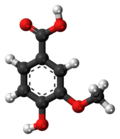Vanillic acid
Vanillic acid is a di-hydroxybenzoic acid that is a derivative of vanillin, the primary component of the extract of the vanilla bean. It is a white crystalline substance with the chemical formula C8H8O4. Vanillic acid is found in the plant kingdom, notably within the seeds of Vanilla planifolia, as well as in some other fruits, vegetables, olives, and wines. It is also a byproduct of the degradation of lignin, one of the principal components of wood, making it prevalent in the paper industry.
Chemical Properties[edit]
Vanillic acid has a molecular weight of 168.15 g/mol and melts at 208 to 210 °C. It is slightly soluble in water, more so in hot water, and highly soluble in ethanol and diethyl ether. Structurally, it consists of a benzoic acid core substituted with hydroxyl groups at the 3 and 4 positions and a methoxy group at the position 1.
Biosynthesis and Degradation[edit]
In nature, vanillic acid is synthesized through the phenylpropanoid pathway, which is involved in the production of a wide range of plant secondary metabolites. The degradation of lignin through bacterial and fungal action can also yield vanillic acid. This process is crucial in the carbon cycle, returning carbon from lignin, a major component of plant biomass, back into the ecosystem.
Applications[edit]
Vanillic acid has various applications in the food, cosmetic, and pharmaceutical industries. In the food industry, it is used as a flavoring agent, imparting a mild vanilla flavor. In cosmetics, it is utilized for its antioxidant properties, helping to protect products from oxidation and extend their shelf life. In medicine, vanillic acid has been studied for its potential anti-inflammatory, antimicrobial, and antioxidant properties. It has shown promise in various studies for its potential to mitigate oxidative stress and inflammation, making it of interest in the treatment and prevention of certain diseases.
Health Effects[edit]
Research indicates that vanillic acid may have several beneficial health effects. Its antioxidant activity can help neutralize harmful free radicals, potentially reducing the risk of chronic diseases such as cancer and heart disease. Additionally, its anti-inflammatory properties may make it useful in the treatment of conditions characterized by inflammation. However, further research is needed to fully understand its health benefits and potential therapeutic uses.
Environmental Impact[edit]
As a natural product of lignin degradation, vanillic acid plays a role in the carbon cycle and is considered environmentally benign. Its production and use in various industries do not pose significant environmental risks. However, the sustainability of its sourcing, particularly from vanilla plants, can be a concern due to the intensive labor required for vanilla cultivation and the potential for habitat destruction.
-
Vanillic acid 3D ball model
Ad. Transform your life with W8MD's Budget GLP-1 injections from $49.99


W8MD offers a medical weight loss program to lose weight in Philadelphia. Our physician-supervised medical weight loss provides:
- Weight loss injections in NYC (generic and brand names):
- Zepbound / Mounjaro, Wegovy / Ozempic, Saxenda
- Most insurances accepted or discounted self-pay rates. We will obtain insurance prior authorizations if needed.
- Generic GLP1 weight loss injections from $49.99 for the starting dose of Semaglutide and $65.00 for Tirzepatide.
- Also offer prescription weight loss medications including Phentermine, Qsymia, Diethylpropion, Contrave etc.
NYC weight loss doctor appointmentsNYC weight loss doctor appointments
Start your NYC weight loss journey today at our NYC medical weight loss and Philadelphia medical weight loss clinics.
- Call 718-946-5500 to lose weight in NYC or for medical weight loss in Philadelphia 215-676-2334.
- Tags:NYC medical weight loss, Philadelphia lose weight Zepbound NYC, Budget GLP1 weight loss injections, Wegovy Philadelphia, Wegovy NYC, Philadelphia medical weight loss, Brookly weight loss and Wegovy NYC
|
WikiMD's Wellness Encyclopedia |
| Let Food Be Thy Medicine Medicine Thy Food - Hippocrates |
Medical Disclaimer: WikiMD is not a substitute for professional medical advice. The information on WikiMD is provided as an information resource only, may be incorrect, outdated or misleading, and is not to be used or relied on for any diagnostic or treatment purposes. Please consult your health care provider before making any healthcare decisions or for guidance about a specific medical condition. WikiMD expressly disclaims responsibility, and shall have no liability, for any damages, loss, injury, or liability whatsoever suffered as a result of your reliance on the information contained in this site. By visiting this site you agree to the foregoing terms and conditions, which may from time to time be changed or supplemented by WikiMD. If you do not agree to the foregoing terms and conditions, you should not enter or use this site. See full disclaimer.
Credits:Most images are courtesy of Wikimedia commons, and templates, categories Wikipedia, licensed under CC BY SA or similar.
Translate this page: - East Asian
中文,
日本,
한국어,
South Asian
हिन्दी,
தமிழ்,
తెలుగు,
Urdu,
ಕನ್ನಡ,
Southeast Asian
Indonesian,
Vietnamese,
Thai,
မြန်မာဘာသာ,
বাংলা
European
español,
Deutsch,
français,
Greek,
português do Brasil,
polski,
română,
русский,
Nederlands,
norsk,
svenska,
suomi,
Italian
Middle Eastern & African
عربى,
Turkish,
Persian,
Hebrew,
Afrikaans,
isiZulu,
Kiswahili,
Other
Bulgarian,
Hungarian,
Czech,
Swedish,
മലയാളം,
मराठी,
ਪੰਜਾਬੀ,
ગુજરાતી,
Portuguese,
Ukrainian

